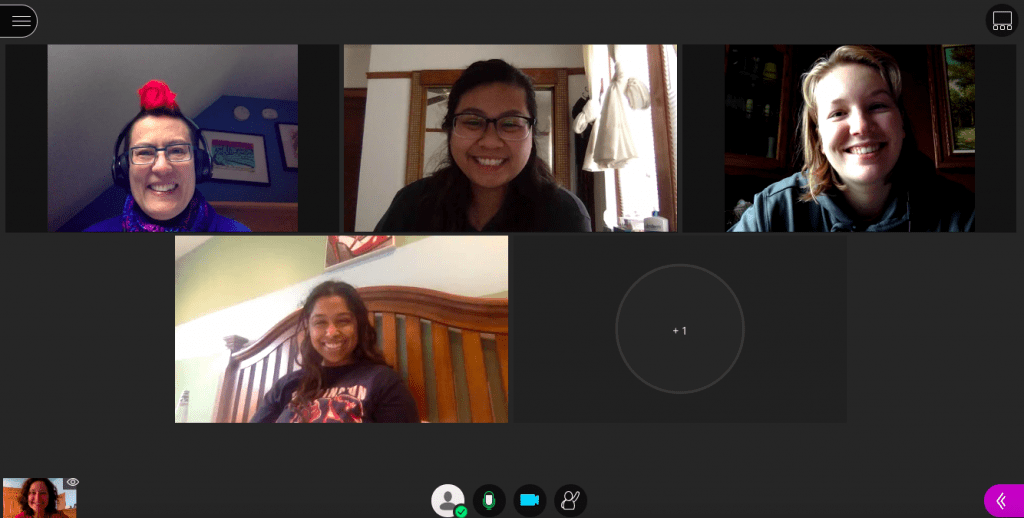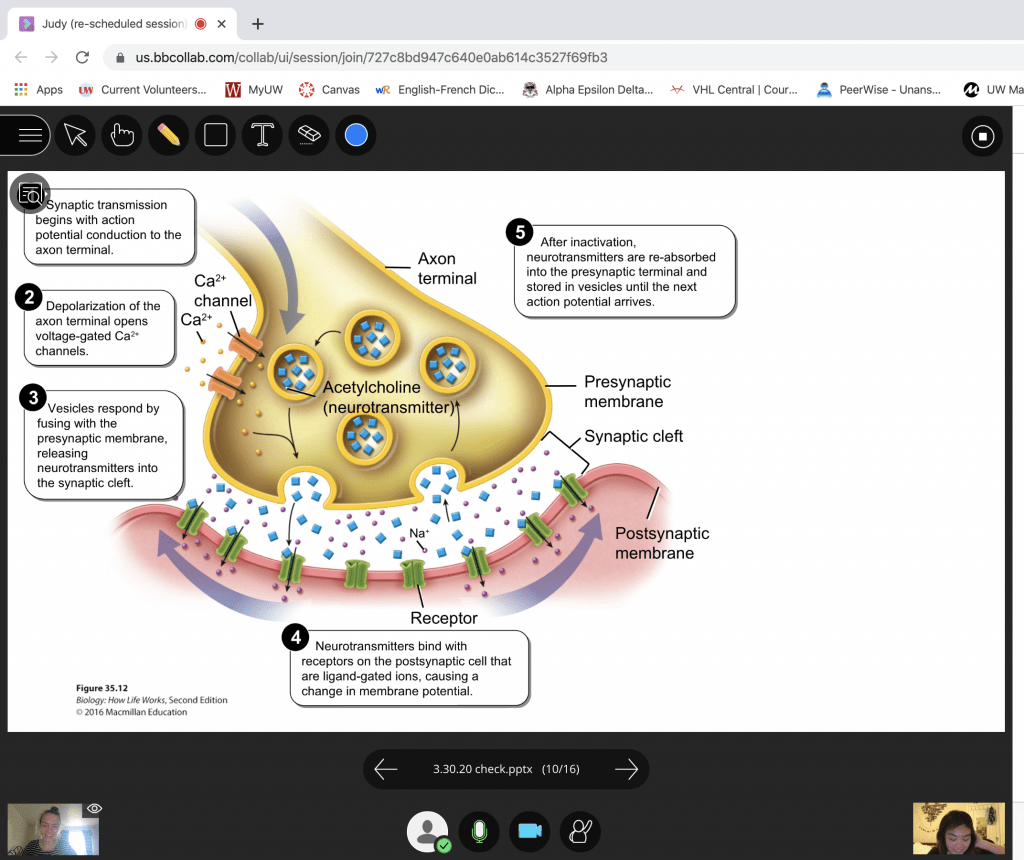Tutoring, advising support go online for students

A Physics Learning Center learning team meets online for a study session. Upper row, from left, are staff member Amihan Huesmann, student Cathy Tran and student Isabel Delo. On the second row is Thrishna Chathurvedula. The small photo in the lower left is peer mentor tutor Natasha Ignatowski. Submitted photo
Learning at UW–Madison doesn’t just happen in classrooms.
Tutoring, advising, career services and other support services, often done one-on-one or in small groups, are a big part of the university experience for students. They help students plan for the future, learn difficult coursework and be part of a supportive community with similar backgrounds or interests.
Now, with the end of face-to-face education this semester because of the COVID-19 crisis, these services are moving online to provide needed support to students remotely. It’s both a technical and an emotional challenge, advisors say.
“We remain focused on helping students plan for future semesters and life after graduation,” says Wren Singer, associate vice provost and director of Undergraduate Advising and Career Services. “Planning is more important than ever right now, and we are ready to help.”
A key challenge will be to maintain the many informal support communities, where students often connected by dropping by an office or stopping to talk in the hallway.
For instance, students liked to pop by the Centers for Pre-Health and Pre-Law Advising, a welcoming space in the Middleton building, for drop-in advising or to relax between classes, said Molly Reinhard, director of Pre-Professional Advising. There, advisors support students and alumni to navigate preparation for careers in health care and law as well as professional program application processes.
“This physical space no longer exists for us or for our advisees. While we have always taken innovative approaches to advising, including offering remote appointments, we’re asking ourselves, how can we leverage technology, social media, and more to try to create an even more accessible and welcoming virtual space?”
On the bright side, some say, these support services will learn new ways to reach students online, perhaps reaching some they hadn’t before, providing long-term improvements that will continue when the crisis is past.
“We are hoping that this experience will help us figure out how to offer services to students we haven’t been able to serve in the past, such as students who commute to campus and students with many daytime and/or family commitments,” said the Physics Learning Center’s Susan Nossal, Chris Moore and Amihan Huesmann in a statement.
“We’re asking ourselves, how can we leverage technology, social media, and more to try to create an even more accessible and welcoming virtual space?”
Molly Reinhard
The Physics Learning Center’s instruction focuses on active learning and on creating a welcoming and inclusive learning environment for physics students, especially those who struggle with the course material or who feel isolated.
For students who don’t have access to computers, the university is providing laptop checkout during the crisis. Students are to contact instructors or advisors if they don’t have internet access.
Aygul Hoffman, assistant director for Academic Advising and Academic Support for the Center for Academic Excellence, says units are learning to navigate remote work environments while training peer and professional staff to adapt their techniques to new forms of instruction and advising. Peer staff are learning to provide online instruction while also adapting to becoming online learners.
Many challenges must be solved by trial and error. For instance, a tutor and a student must learn how to work on the same document remotely while solving a math problem.
The added challenge for both advising and learning support is helping students set daily schedules and navigate newly found family responsibilities.
“Through this time, we need to stay patient with each other while doing our best to support the student learning,” Hoffman says.
Greater University Tutoring Services (GUTS) has added a Canvas page that will direct students to drop-in tutoring sessions or study skills appointments through Blackboard Collaborate Ultra, says Elizabeth Baldridge, coordinator of Academic Support Services for the Center for the First-Year Experience.
Other tutoring and advising services are using similar technologies, along with Microsoft Teams, Webex, Zoom, Google Hangouts, Skype, telephone and, of course, Canvas.
“We hope the technologies we choose to use for our programs and the functionality they provide will offer some sense of connection for students at a time where they may feel quite disconnected from the campus community,” Baldridge says.
In the Centers for Pre-Health & Pre-Law Advising, appointments are done via platforms chosen by the advisees, whether it’s Microsoft Teams, Google Hangouts, phone call or Skype. “We want to be flexible for advisees and not completely reliant on one technology,” Reinhard said.
“What has not and will not change is that advisors remain committed to supporting each student to navigate their experience, consider potential challenges and opportunities, and reflect on the lessons learned along the way,” Reinhard says.
They do face challenges. Preparing for health careers involves a lot of hands-on training in health care settings, often through volunteering and shadowing, and many of those opportunities have been canceled during the crisis. And many labs and STEM courses that are prerequisites are going online.
“We hope the technologies we choose to use for our programs … will offer some sense of connection for students at a time where they may feel quite disconnected from the campus community.”
Elizabeth Baldridge
“It’s important to understand that what we’re embarking on right now — during COVID emergency operations — is not creating an online educational institution,” Reinhard says. “What we’re doing is shifting a largely in-person educational institution into a temporary online format. We will do the best we can, we will learn from missteps and from using new technology, and we will use those lessons to enhance in-person operations when the time comes. “
At the Wisconsin School of Business, students book virtual advising appointments through Starfish scheduling, much as they did in-person appointments, and they’re conducted through Microsoft Teams, says Assistant Dean Jim Franzone.
“Our goal is to make sure students have access to all our staff and get quick replies to emails and messages,” Franzone says.
On-campus recruiting from employers is a unique challenge in this environment. “Virtual interviews for jobs and internships are still happening, but our ability to work with employers on-site has been completely disrupted,” Franzone says.
Academic Coaching and Tutoring Services (ACTS) for the Division of Diversity, Equity and Educational Achievement has been hosting virtual student jams, “to create virtual spaces for community and strengthen motivation to get through spring semester,” says Africa Lozano-Yarl, director of ACTS.
“A unique challenge to moving online is that everyone is learning together,” Lozano-Yarl says. “This may be a crisis, but it also could be an opportunity for innovative creative learning in ways we have never seen before — taking online learning to the next level. “
Claudia Mosley is director of the Center for Educational Opportunity, which provides advising, coaching and other support for first-generation college students, those who meet federal income requirements, and students with disabilities.
“Our practice is to have a high level of in-person interaction with students to build community and provide support services,” Mosley says. “They will continue to experience face-to-face interactions virtually with professional staff and peer mentors. Canvas is being employed as a platform to make critical resources as well as writing and study skills support easily accessible to all of our students. We hope to also host virtual opportunities for students to gather together in community with one another as a means of continuing the gathering that would have occurred in our physical space.”
—Bryce Richter, Sarah Perdue and Mary Carr Lee contributed to this article




